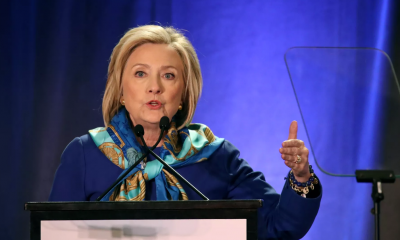World
Clinton’s loses edge over Republicans in presidential race: Poll

By Arun Kumar
Washington: With Democratic frontrunner Hillary Clinton’s lead for party nomination in the 2016 presidential race falling to just 10 points, her advantage against the top Republican contenders has vanished, according to a new poll.
A new CNN/ORC poll found Clinton with 37 percent support among Democratic and Democratic-leaning voters, down 10 points since August, followed by self-proclaimed socialist Senator Bernie Sanders at 27 percent.
Vice President Joe Biden, who is still mulling a presidential bid, stood at 20 percent, up 6 points in the last month.
In the general election matchups, Clinton runs about evenly with Republican frontrunner Donald Trump with 48 percent backing each.
But former neurosurgeon Ben Carson leads Clinton by a significant margin of 51 percent to 46 percent, while former Florida Governor Jeb Bush narrowly leads her 49 to 47 percent.
The shift away from Clinton stems from shrinking support among women, CNN said. Clinton’s advantage among women has disappeared in matchups against Bush and Carson.
Facing Trump, Clinton still carries women by a large, though tighter, margin.
In August, 60 percent of women favoured Clinton to 37 percent for Trump, but that’s narrowed slightly to 55 percent Clinton, 41 percent Trump now.
Clinton’s advantage among women against Trump is fuelled by independent women, despite that group shifting away from Clinton in the head-to-head against Bush.
The poll suggests Republican women have consolidated their support around their party’s front-runners in the last month, and are now more apt to back both Bush and Trump than they were a month ago.
At the same time, the near-universal support for Clinton among Democratic women has softened slightly, bringing it more in-line with her support among Democratic men.
Biden also leads Clinton in hypothetical matchups, topping Bush and Trump while falling just slightly behind Carson.
Biden tops Trump by 10 points (54 percent to 44 percent among registered voters), leads Bush by 8 points (52 percent to 44 percent) and is 3 points behind Carson (50 percent Carson to 47 percent Biden).
Within the Democratic party, Clinton’s support among moderates holds at 47 percent, while among liberals, it has plummeted to just 23 percent.
Sanders has increased his share of the liberal vote (from 42 percent to 49 percent), while falling 9 points among moderates (from 24 percent to 15 percent). Meanwhile, Biden has gained ground in both groups.
But there was some good news also for Clinton in the poll. Most Democrats still say they expect her to be the party’s eventual nominee and the more enthusiastic Democratic voters are more apt to be Clinton backers.
World
Lockdowns in China Force Urban Communities to Defy Censorship and Vent Frustration Online

Shanghai’s rich middle class is leading a wave of online dissent over the strict and prolonged lockdowns imposed in various parts of the country. Chinese internet censorship is struggling as patience is wearing thin in many urban centers, coming up with creative forms of online protests.
Social Media Posts Revealing Lockdown Tension in Shanghai
Drawn-out lockdowns are nothing new in China as authorities insist with the nation’s zero-Covid policy since the start of the pandemic. Currently over This time around, however, metropolitan areas like Shanghai are increasingly difficult to keep quiet, given that its more than 25 million residents have seen weeks of total isolation along with food shortages and many other service interruptions.
Dozens of towns and reportedly over 300 million Chinese citizens have been affected by lockdowns of different severity. As expected, urban netizens have been most outspoken over their difficulties by finding creative ways to get around state censorship and bans placed on topics, news comments and spontaneous campaigns.
Shanghai residents have been using mobile proxies and hijacking seemingly unrelated hashtags to talk about healthcare issues, delivery failures and the overall severity of their situation. The “positive energy” that the Chinese government wants to transmit during the recent prolonged series of lockdowns does not come naturally to those counting food supplies and online censors are working hard to filter words, trending topics and undesired social media sharing.
WeChat groups and message threads are under constant monitoring. Posts questioning the zero-Covid approach have been quickly deleted, including by leading Chinese health experts like Dr. Zhong Nanshan. Video footage is soon censored and protests and investigations are quickly made to disappear.
Where this has not worked, officials have exposed banners with warnings and outright threats like “watch your own mouth or face punishment”, while drones have been patrolling the city skies. Yet, if anything, this has led to further tensions and unspoken confrontation with Shanghai’s educated and affluent middle class.
Creative Online Solutions Harnessing Civic Energy
Announcements by Chinese social media that they would be publishing the IP addresses of users who “spread rumors” have not helped either. Tech industry research has shown that much of Asia’s tech-savvy population has a habit of using mobile proxies and other privacy tools, quickly finding workarounds to browse the internet freely and talk to the world about the hottest topics.
The sheer volume of forbidden posts is already a challenge for the very censorship system, experts explain. Unable to track all trending hashtags, state workers overlook topics that speak about the US, Ukraine or other popular news. Linking human rights elsewhere to their situation, Chinese online dissidents establish their informal channels and “hijack” the conversation to share personal or publicly relevant information about the Covid suppression in their town.
Sarcastic and satirical posts still dominate. Others hope to evade the censors by replacing words from famous poems or the national anthem. One thing is certain – social media, when harnessed with the right creativity, has proven its ability to mount pressure on the government in even some of the most strictly controlled tech environments like China.























